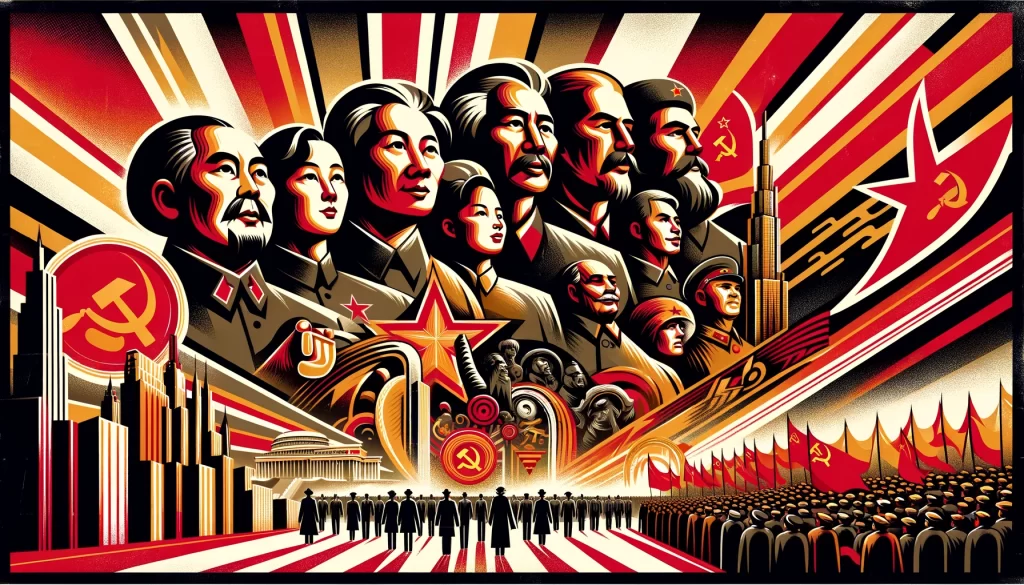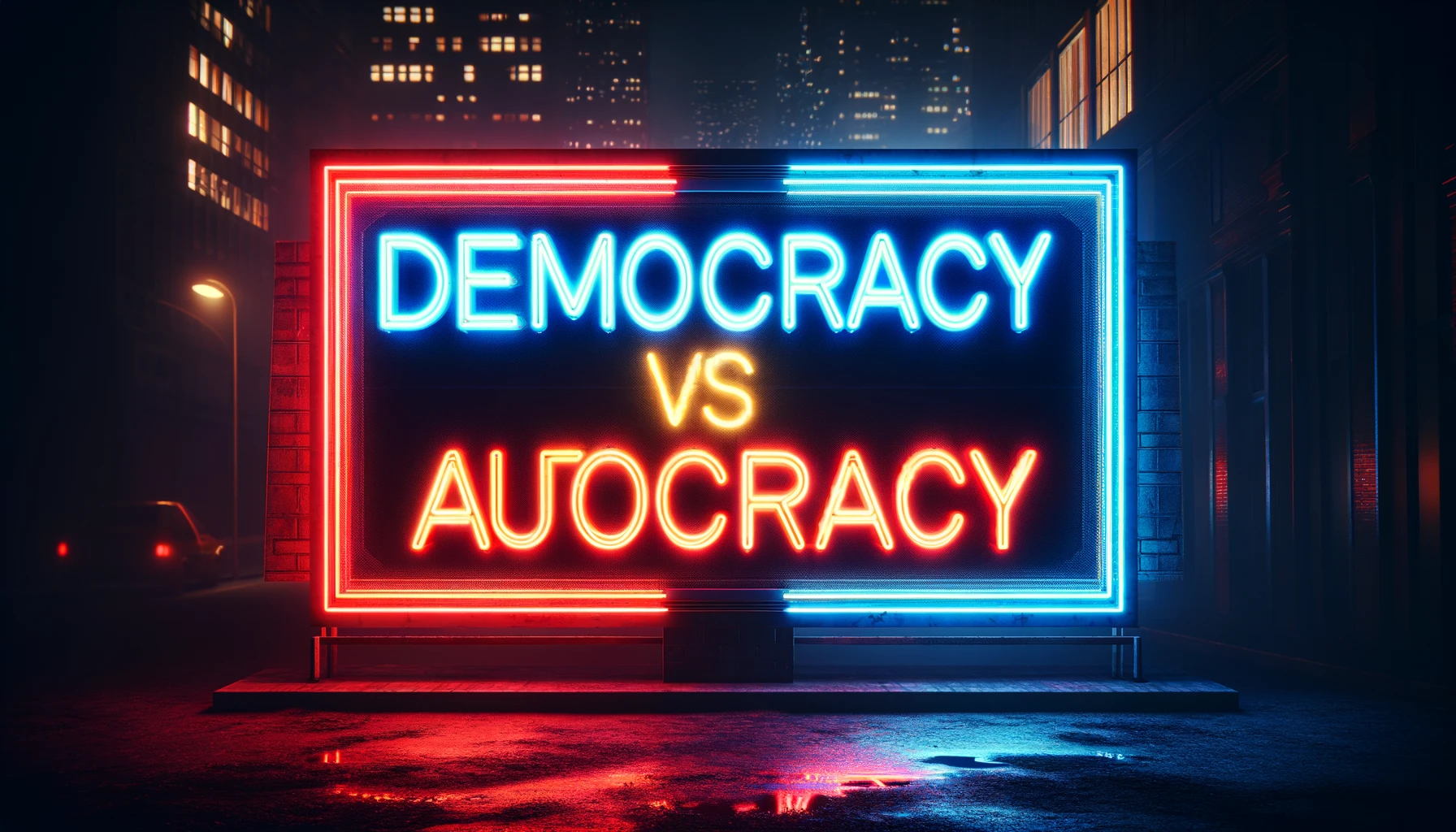In 2022, Xi Jinping was chosen again as the leader of China in an election where he got all 2,950 votes. Right after this, Qin Gang, who works closely with Xi, spoke out against U.S. President Joe Biden. Biden had said that countries like China and Russia, led by Vladimir Putin, don’t follow the same ideas of democracy that Western countries do. Gang argued that China and Russia are working towards a world where no single country is in charge and where there’s more fairness in how countries deal with each other.
However, it’s important to note that both Gang and Biden are speaking from positions where they need to support their own interests. Gang got his job because of his strong support for Xi, and Biden is trying to win people over for his own reelection by making the situation seem very important and urgent. Both are playing the political game, which means we’re not getting the full story from either side.
Democracy, or the idea of people choosing their leaders, didn’t just start in Europe. It’s been around in various forms all over the world, including places like Japan, South Korea, India, and Mexico. So saying that democracy can’t work outside the West isn’t true.
But why do leaders like Xi and Putin, who don’t allow much freedom in their countries, want to seem like they are leading democracies? They do this to keep control and make it look like they have the support of their people, even though they decide what’s best for them, not the other way around.
Russia
Russia’s history shows why it’s different from Western countries in terms of government and society. Even when many European countries were moving towards democracies, Russian leaders didn’t think that would work for them. This belief has lasted for a long time and helps explain why Putin, despite holding elections, doesn’t really follow democratic principles. Instead, he sees his role as defining what it means to be Russian, separate from Western ideas, and insists he’s acting for the good of the people.
Kathryn Stoner, a researcher at the Freeman Spogli Institute for International Studies and director of the Center on Democracy, Development, and the Rule of Law,, says we shouldn’t be surprised Russia isn’t a full democracy because of its history and past experiences. Putin, once seen as someone who might improve Russia’s government, has instead made it less open and more controlled by him, especially as his popularity has gone down. He defines Russia as different from the West, especially in not following liberal ideas, and suggests that any call for real democracy is just Western interference.
Putin still runs elections to show he has support, even though many question how fair these elections are. He claims to represent what the Russian people want, but his actions show he’s more interested in maintaining his own power.
China
In China, the way people think about government is influenced by ideas from Marxism and Maoism. Xi Jinping, the leader of China, has talked about these ideas in articles for the Communist Party’s newspaper. He says China doesn’t agree with what the West calls “universal values” like freedom and democracy because he sees history as a battle between different economic groups, with human society undergoing, through revolutions, the stages of feudalism, democracy, and then communism, finally ending with no centralized government.

Xi argues that while values like democracy were important in the past, they don’t fit into the world as he sees it through Marxist theory. He thinks the West, especially the U.S., is trying to push its own cultural ideas on everyone else, and he doesn’t agree with that. Instead of talking about freedom and human rights, Xi talks about wanting peace, development, and justice for everyone.
But not everyone buys what Xi is saying. Critics like Massimo Introvigne, a sociologist, say that calling these values “Western” and not suitable for everyone is just an excuse used by leaders who don’t want to give their people rights. They point out that this argument is convenient for any leader who doesn’t want to be criticized for not respecting human rights.
In the past, Chinese thinkers knew their country was different from Western nations. The late 19th-century translator and writer Yan Fu, for example, believed the Western model couldn’t just be copied and pasted into China. China’s unique history and culture meant it needed its own version of democracy.
It’s true that democracy looks different in different places. Countries like Japan and Taiwan have their own forms of democracy that work for them. And it’s important to remember that the idea of democracy isn’t just a Western thing; many cultures have contributed to the idea of people having the power to choose their leaders.
However, this doesn’t mean that the abuses of human rights happening in Russia and China today are okay.
The debate about what democracy means can be complicated. Some say it’s okay for different cultures to have their own versions of democracy. But at its core, democracy is about people having the power and using it through fair elections. If a country doesn’t have this, calling it a democracy can be misleading and even dangerous.
According to Massimo Introvigne, no matter how China or any other country tries to redefine democracy and human rights, these concepts are universal. They’re not tied to any one tradition or political system. They’re about what all humans deserve, no matter where they’re from. Xi’s stance is clear: he doesn’t think these universal rights fit into his vision for China, and that’s something the world should pay attention to.
This article is based on the following article:
https://bigthink.com/the-present/democracy-russia-china/

Background Information
Understanding these elements provides readers with a more nuanced view of the global political landscape, encouraging critical thinking about governance, power, and the values shaping our world.
1. Key Global Leaders: Xi Jinping, Vladimir Putin, Joe Biden
- Xi Jinping: As China’s paramount leader, Xi has emphasized strengthening the ruling Communist Party’s control over the nation, promoting the idea of “Socialism with Chinese characteristics,” and asserting China’s power on the world stage. Under his leadership, China has become more assertive in its foreign policy.
- Vladimir Putin: Putin’s tenure has seen Russia pushing back against Western influence and promoting a vision of Russia as a rebalanced power post-Soviet Union. His government has faced criticism for undermining democratic institutions and freedoms within Russia.
- Joe Biden: Biden’s presidency represents a shift towards traditional American foreign policy values, emphasizing democracy, alliances with other democracies, and a firm stance on countries seen as challenging the international order, such as China and Russia.
2. Political Systems: Autocracy vs. Democracy
- Autocracies in the modern context often feature centralized control, limited political pluralism, and restricted civil liberties. They contrast with democracies, where free elections, rule of law, and civil liberties are foundational. The article implies a tension between these systems, with implications for global governance and human rights.
3. Theoretical Underpinnings: Marxism and Maoism
- Marxism posits a historical progression from feudalism to capitalism to socialism, culminating in communism, a stateless, classless society. It critiques capitalist societies for their inherent class conflicts.
- Maoism extends Marxism, emphasizing the potential of the peasantry as a revolutionary force. Mao Zedong adapted Marxist principles to the Chinese context, leading to the establishment of the People’s Republic of China in 1949. Maoism also stresses continuous revolution and mass mobilization.
4. Multipolarity in International Relations
- The concept of a multipolar world challenges the post-Cold War unipolar moment dominated by the United States. Russia and China advocate for a world system where power is more evenly distributed among various nations, arguing it leads to a more democratic and equitable international order.
5. Universal Values vs. Cultural Relativism
- The debate between universalism and cultural relativism questions whether certain values, such as human rights and democracy, are applicable and desirable across all cultures. While universalists argue these principles are foundational for any fair society, cultural relativists suggest that values and systems should be adapted to fit cultural and historical contexts.
6. Historical Perspectives on Democracy and Autocracy
- Russia and China offer contrasting narratives to the Western model of liberal democracy, drawing on their unique historical experiences. Russia’s history of czarist autocracy and the Soviet period influences its current governance model. China’s history, from imperial dynasties to Maoist revolution, shapes its governance and rejection of direct electoral democracy in favor of a single-party system.
7. Human Rights and Global Governance
- The international human rights regime, exemplified by instruments like the Universal Declaration of Human Rights, sets standards for the treatment of individuals by states. Russia and China’s stances challenge this regime by prioritizing sovereignty and non-interference over external critiques of their human rights records.
8. The Role of Elections and People’s Power
- Democracies rely on elections as a mechanism for the people to exercise their power, choosing their leaders and holding them accountable. Autocracies may hold elections but are criticized for lacking genuine competitiveness or for manipulating electoral processes to ensure the ruling party or leader remains in power.
9. Critique and Defense of Democratic Systems
- The article suggests that critiques of Western democracy by leaders like Xi and Putin often highlight flaws within democratic systems (e.g., systemic inequalities, historical injustices) to justify their governance models. Conversely, defenders of democracy argue that, despite imperfections, democratic systems offer mechanisms for correction and improvement not available in autocratic systems.

Debate/Essay Questions
- Is Democracy Universally Applicable?
- Can Autocratic Leaders Justifiably Claim to Represent Their People?
- Are Democracy and Human Rights Only Western Values? Are They Universal or Specific to the West?
- Does the Global Promotion of Democracy Serve as a Veil for Imperialist Agendas?
- Should the International Community Intervene in Nations with Poor Human Rights Records?
Please subscribe to Insight Fortnight, our biweekly newsletter!
